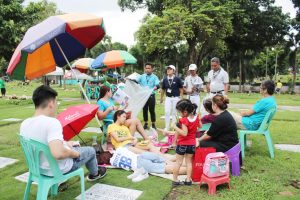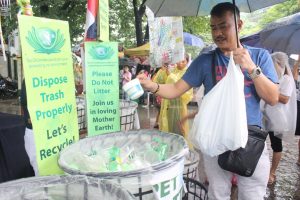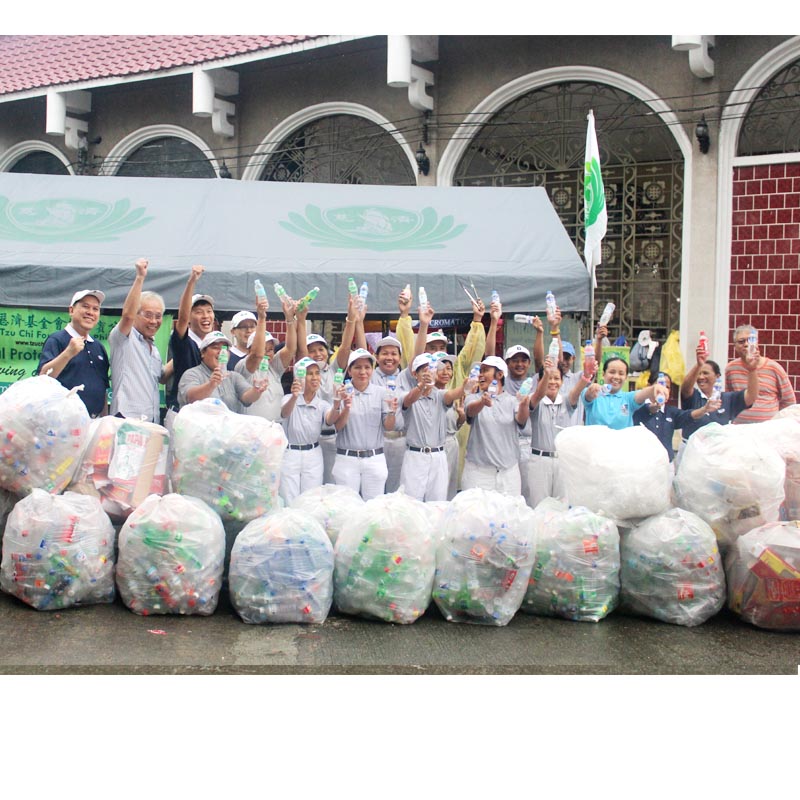
Cemeteries all over the country come to life during Undas, the time of honoring the dearly departed. Filipino families flock to the tombs of their kin, bearing gifts such as flowers, food and fond memories. With bountiful feasts, they treat the departed as if they were still alive.
However, the bustle in cemeteries during this time of the year results in mounds of solid waste littering the narrow streets. Caretakers work round-the-clock to clean as much of the grounds as possible, but they can only collect so much.
In 2010, Tzu Chi Philippines (慈濟菲律賓分會) found its opportunity to propagate environmental awareness on this auspicious holiday.
Tzu Chi volunteers trooped to two cemeteries – Manila North Cemetery and Manila Chinese Cemetery – to help keep them clean in the midst of the bustling holiday. The collection of plastic bottles, cartons and other recyclables is accompanied by an information drive teaching visitors regarding the importance of recycling. The activity has since become Tzu Chi’s way of celebrating Undas.
On its seventh year, Tzu Chi’s Undas recycling activity has expanded to 15 cemeteries: eight in Metro Manila, six in Leyte and one in Rizal province. From Oct. 30 to Nov. 3, in Metro Manila alone, over 1,000 Tzu Chi volunteers were mobilized. At the end of the activity, they collected 3,136 kilos of plastic bottles, 3,115 kilos of cartons, 1,886 kilos of glass bottles and 2,767 kilos of other recyclables.
The recyclables are then brought to Tzu Chi’s recycling center at the Tzu Chi Great Love Campus in Sta. Mesa for processing.
The eight cemeteries in Metro Manila involved in the activity are Manila North Cemetery, Manila Chinese Cemetery, Manila South Cemetery, Loyola Memorial Park Marikina, Loyola Memorial Park Sucat, Manila Memorial Park Holy Cross, Manila Memorial Park Sucat and Himlayang Pilipino. In Rizal, Paraiso Memorial Park in San Mateo joined the activity. In Leyte, of the six participating cemeteries, four are located in Tacloban City and two in Ormoc City.
Tzu Chi’s continued presence at the cemeteries every Undas has become a familiar, even welcome, sight among caretakers and visitors alike. Manila Chinese Cemetery administrator Juancho Pacheco has seen a drastic change in the grounds since becoming one of the two pioneer cemeteries of Tzu Chi’s activity.
“We’ve seen a drastic change over [seven] years. The visitors have noticed the cemetery being cleaner, even adding that Tzu Chi has been a big help. They’ve also learned a great deal about recycling, not just disposing waste outright,” says Pacheco.
In Manila North Cemetery, which attracts the most traffic during Undas, 57-year-old Ferdinand Carreon shares how it takes three to four days to collect the large volume of post-Undas trash. With help from Tzu Chi volunteers, he and his fellow street sweepers have seen less trash to collect.
“The positive thing is that the volunteers personally gather and collect the recyclables so the trash is no longer mixed together, making it easier for us to clean up the area,” says Carreon.

Teaching the future
Despite calls by authorities and concerned groups, post-Undas trash has remained a cause of concern. Statistics from the Metro Manila Development Authority have shown a gradual increase in the volume of waste collected. In 2012, MMDA cleanup teams collected 73 truckloads of garbage in 12 cemeteries. In 2013, the teams collected 98 truckloads of trash in 23 cemeteries. The alarming rise continues in 2014 with 139 truckloads from 21 cemeteries.
MMDA also reports that cleanup teams have collected just five truckloads of garbage this year. However, they only managed to cover six cemeteries, as much of the manpower was allocated to policing the Association of Southeast Asian Nations Summit.
A separate finding by environmental nongovernment organization Greenpeace blames widespread patronage of cheap packaging such as plastics and cartons for the swelling of garbage collected. The lack of discipline in disposing said waste adds to the precarious situation.
In light of this, a Tzu Chi recycling station in each cemetery serves as an information hub for visitors to learn about environmental protection. Each turnover of recyclables by caretakers and visitors come with pamphlets and a talk about how to recycle. General awareness has been on the rise, albeit slowly.
“Before, I don’t segregate my waste. Now, I make it a habit to segregate plastic from the biodegradables so that I can give the former to whoever needs them,” shares Cecil Alpay, visiting Loyola Memorial Park in Marikina City.
“I heard about how seabirds are accidentally ingesting plastics from the oceans, thinking they are food. That’s why we really have to limit the use of plastic now. If we can recycle our trash, let us do it. What Tzu Chi is doing is teaching Filipinos to become disciplined in segregating their trash,” shares Eunille Padernal, visiting Manila North Cemetery.
The public has also felt the need to support such activities more upon learning that mere plastic bottles can be turned into blankets. Such is possible with DaAi (大愛 Great Love) Technology where the bottles are chopped up, melted and spooled into fiber as raw material for thermal blankets and apparel. The thermal blankets see use among victims of natural and man-made calamities, among the most notable the aftermath of Typhoon Yolanda (Haiyan) in 2013.
“For us, empty plastic bottles don’t lose their usefulness. They can still be recycled and be of use to others,” says Miguel Mendoza, a visitor at Manila South Cemetery in Makati City.

The dogged drive to educate the masses pins its hopes on the young generation, hoping for them to develop the mindset of an environmental steward. Among the ranks of the volunteers, Tzu Chi scholar Juvert Funtaniel pays no heed to the eyes of skeptics as he does his part. He carries out his recycling task, knowing that he’s doing the right thing.
“This is important for us because change begins not with others but ourselves. We chose to become Tzu Chi volunteers and participate in recycling, which in turn inspires more people to do the same,” says Funtaniel, assigned to Manila Memorial Park Sucat along with her mother who is a cash-for-work volunteer.
“As a millennial, I want to experience breathing fresh air and see a more beautiful Earth for the next generation, an Earth that hasn’t run out of plants, trees and water. Our decisions and actions define the results in the long run, especially involving the environment,” Funtaniel adds.
Fellow scholar Kate Gelsie Nacilam believes that educating the young ones is the surest way of making sure Tzu Chi’s message gets across. Joining the volunteers at Manila Chinese Cemetery, she puts to practice everything she has learned in the foundation’s monthly humanity class for scholars.
“I realized that we must open our eyes to the idea of recycling as early as childhood to be able to help not just the environment but ourselves, so that we can benefit from a cleaner and greener world,” says Nacilam.
In his book Tzu Chi: Serving with Compassion, Mark O’Neill describes Dharma Master Cheng Yen’s two-fold purpose of recycling. One is to reduce the alarming consumption of resources and save the Earth from man-made destruction. The other is to provide the living the opportunity to practice Buddhism, at least its principles. A simple gathering of men, women and youth for recycling serves to enrich the spirit. Master Cheng Yen tells the volunteers not to fear the filth but see it as something sweet to cultivate humility.
Wherever Tzu Chi’s Undas recycling activity takes them next, the philosophy behind recycling will remain the same, if not evolve. The thousands of dedicated hands, no matter the reason for their participation, envision a future where everyone has learned to be mindful of their trash. They envision a future where Filipinos honor Mother Nature as much as they honor their dearly departed.
